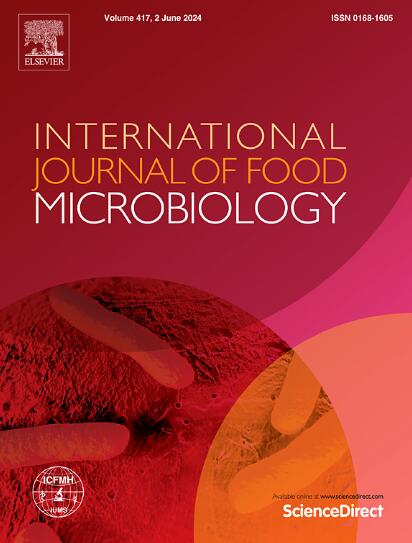Genomic and transcriptomic analyses of ropy slime producing Latilactobacillus sakei reveal a specific exopolysaccharide cluster with temperature-dependent transcription activity
IF 5
1区 农林科学
Q1 FOOD SCIENCE & TECHNOLOGY
International journal of food microbiology
Pub Date : 2025-07-05
DOI:10.1016/j.ijfoodmicro.2025.111336
引用次数: 0
Abstract
Latilactobacillus sakei is a psychrotrophic lactic acid bacterium (LAB) with a wide genomic diversity. It is mainly associated with food fermentation, but some strains can spoil meat products by generation of ropy exopolysaccharide (EPS). Despite the important role of L. sakei in foods, virtually nothing was known about the gene cluster related to the formation of ropy EPS or how temperature affected its expression. Furthermore, no experimental in vitro model system for experimenting with EPS production was available. The ability to form ropy EPS has been evaluated either with an inoculation study or testing the ropiness of a colony.
To address these limitations, we (I) sequenced the genomes of 59 L. sakei strains, (II) characterized their EPS gene clusters and performed comparative genomic and phylogenetic analyses, (III) developed an in vitro model system for EPS production and (IV) tested the effect of temperature on EPS production using transcriptomic analysis of RNA-seq data from a longitudinal growth experiment at 10 °C and 30 °C.
Genomic analyses showed showed the existence of one phylogenetically highly similar group of strains. Characterisation of the EPS gene cluster revealed that it differs from known bacterial EPS clusters in that it lacks separate epsB and epsC genes. Temperature had a noticeable effect on EPS production, with strong ropy EPS production at 10 °C whereas no visible EPS was detected at 30 °C. Transcriptomic analyses revealed differences in the EPS cluster activity, with the first half of the cluster being more active at 10 °C and the second half at 30 °C.
对产粘稠黏液的萨克乳酸杆菌的基因组学和转录组学分析揭示了一个具有温度依赖性转录活性的特异性外多糖簇
酒井乳酸杆菌是一种具有广泛基因组多样性的精神营养乳酸菌(LAB)。它主要与食品发酵有关,但一些菌株可以通过产生粘稠的外多糖(EPS)来破坏肉制品。尽管l.s akei在食品中扮演着重要的角色,但实际上人们对与粘稠EPS形成相关的基因簇以及温度如何影响其表达一无所知。此外,没有实验体外模型系统来试验EPS的产生。通过接种研究或测试菌落的粘稠性来评估形成粘稠EPS的能力。为了解决这些限制,我们(I)对59株L. sakei菌株的基因组进行了测序,(II)对其EPS基因簇进行了表征,并进行了比较基因组和系统发育分析,(III)开发了EPS体外模型系统,(IV)利用10°C和30°C纵向生长实验的RNA-seq数据进行转录组学分析,测试了温度对EPS产生的影响。基因组分析表明存在一个系统发育高度相似的菌株群。EPS基因簇的特征表明,它不同于已知的细菌EPS簇,因为它缺乏单独的epsB和epsC基因。温度对EPS的产生有明显的影响,在10°C时产生了很强的粘稠EPS,而在30°C时没有检测到明显的EPS。转录组学分析揭示了EPS簇活性的差异,簇的前半部分在10°C时更活跃,而在30°C时后半部分更活跃。
本文章由计算机程序翻译,如有差异,请以英文原文为准。
求助全文
约1分钟内获得全文
求助全文
来源期刊
CiteScore
10.40
自引率
5.60%
发文量
322
审稿时长
65 days
期刊介绍:
The International Journal of Food Microbiology publishes papers dealing with all aspects of food microbiology. Articles must present information that is novel, has high impact and interest, and is of high scientific quality. They should provide scientific or technological advancement in the specific field of interest of the journal and enhance its strong international reputation. Preliminary or confirmatory results as well as contributions not strictly related to food microbiology will not be considered for publication.

 求助内容:
求助内容: 应助结果提醒方式:
应助结果提醒方式:


